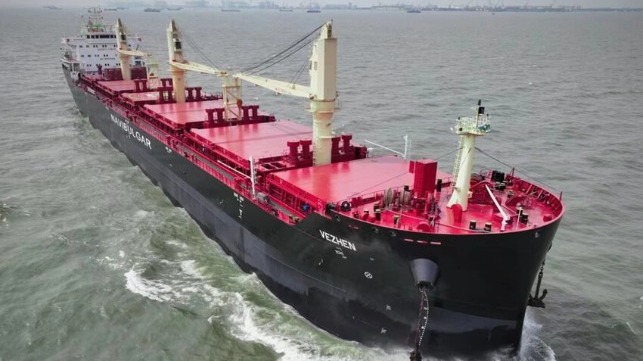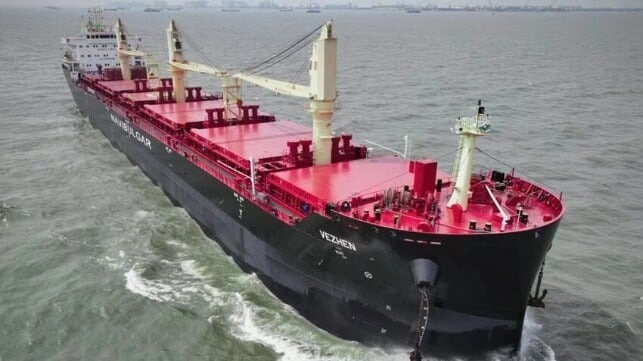Bulker Suspected of Subsea Cable Sabotage Has a Broken Anchor

For the fourth time in little more than a year, a ship calling in Russia has been accused of dragging an anchor under power and cutting a subsea cable in the Baltic. For the fourth time in a row, the vessel in question has a visibly damaged port anchor.
The bulker in Sunday's incident, the Vezhen, was seized by Sweden on Sunday on suspicion of aggravated sabotage after a cable outage between Gotland and Latvia. Sweden's coast guard quickly intercepted the vessel as soon as the cable breach was identified. The crew opted to divert out of the legal safety of international waters and into Swedish territorial seas, where it was detained; when asked by SVT whether they changed course voluntarily, a senior Swedish prosecutor declined to answer.
Vezhen is operated by Bulgarian shipping company Navigation Maritime Bulgare (Navibulgar) and flagged in Malta. By examining corporate records in Hong Kong, Finnish outlet Helsingin Sanomat determined that the ultimate beneficial owner is ICBC Leasing, a financier owned by the Chinese state.
Navibulgar CEO Alexander Kalchev told SVT that the anchor came loose in heavy weather, and that it was an accident. “This is something that needs to be proven,” he said.
In a statement, the firm said that it is focused on the safety of the crew and is cooperating in the investigation.
"Navigation Maritime Bulgare JSC does not have information about any intentional actions by the crew of the m/v Vezhen that could lead to such an incident," Navibulgar said in a statement. "According to the information we have received, this is a force majeure situation that occurred due to the unfavorable hydrometeorological conditions in the area."
The Vezhen incident is the fourth of its kind since 2023, and the fourth in which the operator has claimed accidental damage. Maritime analysts have noted that in each instance, the ship would have to accidentally drop the port anchor, then overlook the effects of a dragging port anchor on speed and heading.
Bulker Operator Claims Proof That Subsea Cable Damage Was Accidental

Bulgarian shipping company Navibulgar has released images of the anchoring system aboard the bulker Vezhen, which has been boarded and detained on suspicion of dragging its anchor and damaging a subsea cable between Gotland and Latvia last weekend. According to Navibulgar CEO Capt. Alexander Kalchev, the photos show that the chain stopper failed in a gradual way that allowed the chain to "leak" out slowly under tension, without a runaway.
The Vezhen was seized by Sweden on Sunday on suspicion of aggravated sabotage after a cable outage between Gotland and Latvia. Sweden's coast guard intercepted the vessel as soon as the cable breach was identified, and a police boarding team deployed to the ship by military helicopter. The crew agreed to divert to Swedish territorial seas, where the ship was detained. A senior Swedish prosecutor and a senior police official have both declined questions about whether the diversion was voluntary.
Navibulgar's Kalchev insists that the incident was an accident, and has opened an internal investigation. He told Bulgarian business outlet Economic that as Vezhen approached Gotland on Saturday, weather conditions were rough, with waves of 10 feet and winds of 40 knots. Surveillance footage from the bridge shows that the Vezhen's bow took a pounding. In these conditions, the wave action worked the port anchor back and forth until the wire stopper on the chain failed, he said. After that, all the weight of the chain and anchor hung on the guillotine stopper. The stopper failed gradually under tension, letting a few links slip underneath the bar at a time, he said.
"[The guillotine stopper] bore the blows of every wave that crashed into the axis of the ship, which little by little led to its wear and tear and the gradual 'leakage' of the chain into the sea," explained Kalchev. He said that such incidents had happened before, but never causing subsea cable damage. (Guillotine stopper failures have been reported previously in the near-miss literature.)
According to Kalchev, the wear on the stopper bar proved that the anchor drop was accidental, even if expensive and politically ill-timed. "There is no way to calculate at what point the wire and guillotine would give way and drop the anchor at the exact moment when the ship is next to the cable in order to deliberately cause an incident," he said.
For now, the ship's crew have been neither detained nor questioned, Kalchev said. "The investigation is probably ongoing, but there are no investigators on board the ship and no interviews have been conducted with the crew," he told the outlet.
Latvia Reports New Subsea Cable Breach Caused by "External Damage"

Early on Sunday morning, a subsea fiber-optic cable between Gotland and Latvia was "significantly damaged," according to the Latvian State Radio and Television Centre (LVRTC). Vineta Sprugaine, Head of Corporate Communications at LVRTC, said in a statement that there is reason to believe that the damage was caused by "external forces," but the precise location and extent of damage have not yet been identified.
LVRTC has recommended a criminal investigation into the cause of the breach, and state police chief Armands Ruks told Latvian outlet LTV that a criminal proceeding has been opened for "intentional damage to another's property."
NATO is responding to the break as a potential anchor-drag incident, the fourth in little more than a year in the Baltic. Warships from NATO's Baltic security patrol mission have intercepted two ships, one of which has been detained. Open-source intelligence analysts have identified the suspect vessels as the Maltese-flagged bulker Vezhen and the Russia-linked LNG carrier Pskov, formerly operated by Russian state shipping company Sovcomflot.
The disruption occurred on the Ventspils-Gotland section of the data cable in the early hours of Sunday morning. Vezhen was transiting close to Gotland, within the Swedish EEZ, and AIS data appears to show that she slowed for half an hour after passing the cable crossings. Pskov was in international waters, and her AIS track showed signs of transmission interruption, a possible indication that the transceiver may have been temporarily turned off.
Like most vessels in the Sovcomflot fleet, Pskov's ownership and management were recently transferred to holding companies in business-friendly jurisdictions. As of Sunday evening, the vessel was still under way in the Baltic in international waters, escorted by multiple NATO patrol vessels.
"Sweden, Latvia and NATO are closely cooperating on the matter. Sweden will contribute with relevant capabilities to the effort to investigate the suspected incident," said Swedish Prime Minister Ulf Kristersson.
No comments:
Post a Comment